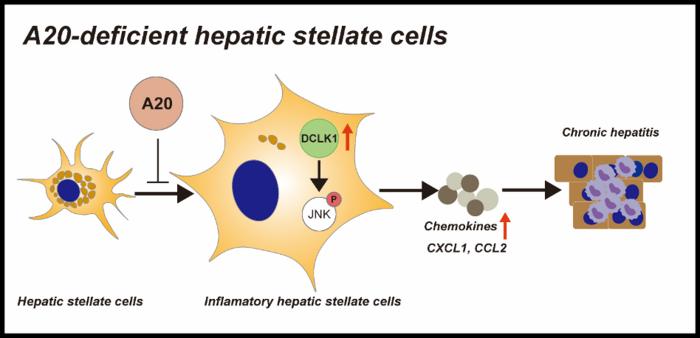Researchers from Tokyo Medical and Dental University (TMDU) determine how a protein called A20 can regulate the inflammatory response to suppress chronic hepatitis

Credit: Department of Gastroenterology and Hepatology, TMDU
Researchers from Tokyo Medical and Dental University (TMDU) determine how a protein called A20 can regulate the inflammatory response to suppress chronic hepatitis
Tokyo, Japan – Many individuals worldwide suffer from chronic liver disease (CLD), which poses significant concerns for its tendency to lead to hepatocellular carcinoma or liver failure. CLD is characterized by inflammation and fibrosis. Certain liver cells, called hepatic stellate cells (HSCs), contribute to both these characteristics, but how they are specifically involved in the inflammatory response is not fully clear. In a recent article published in The FASEB Journal, a team led by researchers at Tokyo Medical and Dental University (TMDU) uncovered the role of tumor necrosis factor-α-related protein A20, shortened to A20, in this inflammatory signaling.
Previous studies have indicated that A20 has an anti-inflammatory role, as mice lacking this protein develop severe systemic inflammation. Additionally, certain genetic variants in the gene encoding A20 result in autoimmune hepatitis with cirrhosis. This and other published work made the TMDU team become interested in how A20 functions in HSCs to potentially affect chronic hepatitis.
“We developed an experimental line of mice called a conditional knockout, in which about 80% to 90% of the HSCs lacked A20 expression,” says Dr Sei Kakinuma, an author of the study. “We also simultaneously explored these mechanisms in a human HSC cell line called LX-2 to help corroborate our findings in the mice.”
When examining the livers of these mice, the team observed inflammation and mild fibrosis without treating them with any inducing agent. This indicated that the observed inflammatory response was spontaneous, suggesting that HSCs require A20 expression to suppress chronic hepatitis.
“Using a technique called RNA sequencing to determine which genes were expressed, we found that the mouse HSCs lacking A20 displayed expression patterns consistent with inflammation,” describes Dr Yasuhiro Asahina, one of the study’s senior authors. “These cells also showed atypical expression levels of chemokines, which are important inflammation signaling molecules.”
When working with the LX-2 human cells, the researchers made similar observations to those for the mouse HSCs. They then used molecular techniques to express high amounts of A20 in the LX-2 cells, which resulted in decreased chemokine expression levels. Through further investigation, the team identified the specific mechanism regulating this phenomenon.
“Our data suggest that a protein called DCLK1 can be inhibited by A20. DCLK1 is known to activate an important pro-inflammatory pathway, known as JNK signaling, that increases chemokine levels,” explains Dr Kakinuma.
Inhibiting DCLK1 in cells with A20 expression knocked down resulted in much lower chemokine expression, further supporting that A20 is involved in inflammation in HSCs through the DCLK1-JNK pathway.
Overall, this study provides impactful findings that emphasize the potential of A20 and DCLK1 in novel therapeutic development for chronic hepatitis.
###
The article, “A20 in hepatic stellate cells suppresses chronic hepatitis by inhibiting DCLK1-JNK pathway-dependent chemokines,” was published in The FASEB Journal at DOI: 10.1096/fj.202400109R
Journal
The FASEB Journal
Article Title
A20 in hepatic stellate cells suppresses chronic hepatitis by inhibiting DCLK1–JNK pathway-dependent chemokines



